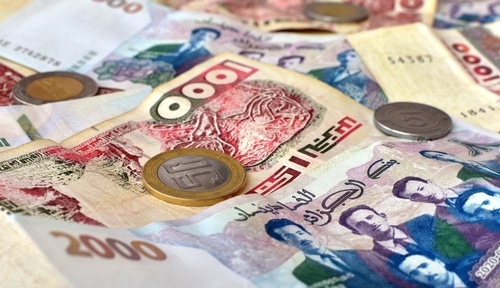The Algerian dinar, often abbreviated as DZD, is the official currency of Algeria, a country rich in history, culture, and economic potential. For those unfamiliar with Algeria’s financial framework, understanding how the dinar operates is crucial if you’re planning to visit, invest, or send money to loved ones in the country.
This blog provides all the key details you need about the Algerian dinar—from its history and current use to helpful tips for dealing with it in day-to-day transactions. By the end of this post, you’ll have a clear understanding of one of North Africa’s most important currencies.
A Brief History of the Algerian Dinar
The Algerian dinar came into existence in 1964, replacing the Algerian franc that had been used during the French colonial era. The name “dinar” reflects Algeria’s cultural ties to the Arab world, as many countries in the region also use this nomenclature for their currencies.
Initially pegged to the French franc, the dinar has gone through several phases of change, impacted by global currency trends and domestic reforms. Today, it is a free-floating currency, although it is tightly managed by the Central Bank of Algeria.
Dinar Denominations
The Algerian dinar exists in various denominations for both coins and banknotes:
- Coins range from 1 DZD to 100 DZD. Smaller denominations, like 5 and 10 dinar coins, are commonly used for everyday purchases.
- Banknotes are available in denominations of 200, 500, 1,000, and 2,000 dinars. These larger notes are mainly used in higher-value transactions.
Visitors to Algeria should carry a mix of coins and smaller banknotes for convenience, as small businesses and local vendors may not always provide change for larger amounts.
How is the Algerian Dinar Used Today?
The Algerian dinar is central to the country’s economic activities, from local transactions to international trade. Here’s a closer look at its significance in various areas:
Daily Transactions
Locally, the dinar is used for everything—from groceries in bustling markets to transportation fares. However, Algeria remains predominantly a cash-based society. While larger establishments in urban areas accept debit or credit cards, cash is king in rural regions.
International Money Transfers
For Algerians living abroad, sending money back home is a top priority. The Algerian dinar plays a pivotal role in connecting the diaspora with their families through international remittances. However, due to exchange rate fluctuations, many expats rely on trusted services to assure transparent conversions and competitive rates.
Tourism
Tourism in Algeria is growing, and understanding the local currency helps visitors enjoy their stay without unnecessary financial confusion. Make sure to exchange your currency at licensed exchange bureaus, as black-market transactions can lead to legal consequences and unfair rates.
Exchange Rates and Value
The Algerian dinar experiences significant fluctuations in value based on domestic economic factors and global market trends. On average, one US dollar ($1) is equivalent to roughly 140–150 DZD, but the rate varies depending on geopolitical situations and global oil prices.
To get the most up-to-date exchange rate, use credible financial platforms or consult your money transfer provider. Some banks and money services offer currency calculators to give you an accurate daily exchange rate.
Tips for Managing Exchange Rates:
- Shop Around for the Best Rates: Banks and exchange bureaus may offer slightly different rates.
- Avoid Airport Exchanges where rates are generally less favorable.
- Monitor Trends if you’re looking to save on a large transaction. Choose the optimal timing to exchange.
Challenges Facing the Algerian Dinar
Like many currencies in developing economies, the Algerian dinar faces some challenges:
- Inflation: Algeria has experienced rising inflation in recent years, which impacts the purchasing power of the dinar.
- Dependence on Oil and Gas: Algeria’s economy is heavily reliant on hydrocarbon exports, making the dinar susceptible to global oil price fluctuations.
- Exchange Rate Controls: The government and central bank tightly manage the official exchange rate, leading to discrepancies between the official and black-market rates.
Sending Money to Algeria? What You Should Know
For those sending money to loved ones in Algeria, there are a few things to keep in mind:
- Always choose a reputable transfer service to ensure low fees, reliable delivery, and competitive exchange rates.
- Confirm transfer limits and fees upfront to avoid surprises.
- Delivery options matter. Most money transfer services allow recipients to receive funds either in local bank accounts or as cash pickups.
Why Financial Transparency Matters
When dealing with international money transfers or any financial affairs involving the Algerian dinar, transparency is essential. Hidden fees, vague exchange rates, and unreliable services can lead to financial stress. That’s why choosing trustworthy platforms with clear terms is vital for peace of mind.
At [Your Brand/Service Name], we make sending money to Algeria straightforward and secure. Whether you’re supporting loved ones or exploring ways to trade with Algerian businesses, we’re here to help you manage your finances efficiently.
How to Prepare for Using Dinars
If you’re heading to Algeria or planning financial dealings in the local currency:
- Understand Exchange Rates: Use a currency converter for real-time updates before exchanging money.
- Carry Local Cash: Always have dinars on hand for smaller transactions.
- Watch Out for Scams: Only deal with licensed money changers and financial institutions.
- Leverage Reliable Services for international transfers or large sums.
Strengthening Economic Connectivity
Despite its challenges, the Algerian dinar symbolizes the resilience of Algeria’s economy. It functions as a bridge between local industries and the global market, reinforcing the country’s growing importance in Africa and beyond. For businesses, tourists, and the Algerian diaspora, understanding this currency paves the way for smoother transactions and deeper connections.
